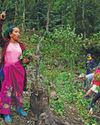
THERE WAS a time when heart-shaped leaves of betel (Piper betle) were served after dinner in nearly every household. Panwaris, or paan sellers, would set up shop on street corners and offer customised beedas (quids); or people would just buy the leaves and prepare them at home with ingredients such as areca nut, slaked lime, cardamom, cloves, fennel, saffron, coconut and gulkand (a sweet preserve of rose petals). A beeda after a meal was believed to aid digestion and freshen the breath.
It was so popular that people believed knowing the "correct" way to eat paan was the epitome of cultured life. The saying "Bandar ko diya paan, lagaa roti sa chabaan" (if you give paan to a monkey, he will eat it like a roti) is used to refer to a lack of finesse in behaviour.
However, think of paan nowadays, and it is likely to conjure an image of red spit-covered walls-a mess made by tobacco chewers who use betel leaves to wrap and flavour the intoxicant. Traditionally, the leaf would be chewed and swallowed, but when used with tobacco, the saliva has to be spat out. This practice is considered to have begun around the 16th century when tobacco was introduced in the country by Portuguese invaders.
The name "betel" was also first used in the 16th century by the Portuguese, most probably derived from vetila-the Malay word for leaf. The Malayalam and Tamil names for betel leaf are also similar-sounding, vettila and vettilai, respectively. In Kannada, betel is taamboola, in Manipuri kwa and in Marathi naagavaela.
This story is from the {{IssueName}} edition of {{MagazineName}}.
Start your 7-day Magzter GOLD free trial to access thousands of curated premium stories, and 9,000+ magazines and newspapers.
Already a subscriber ? Sign In
This story is from the {{IssueName}} edition of {{MagazineName}}.
Start your 7-day Magzter GOLD free trial to access thousands of curated premium stories, and 9,000+ magazines and newspapers.
Already a subscriber? Sign In

On shaky ground
Despite reporting net gains in green cover, the latest forest survey shows degradation of natural forests, particularly in ecologically sensitive hotspots

Burden of proof
The government's drive for e-KYC verification to ensure rightful targeting of beneficiaries has proved exclusionary for many

Rupee slide impacts agricultural trade
THE UNION Cabinet on January 1, 2025, approved the extension of a subsidy package of ₹3,500 per tonne on di-ammonium phosphate (DAP) for companies.

THE 500 GW SWITCH OVER
Coal is the king of energy at present. India needs to dislodge it with clean energy for an equitable green transition

MANIFESTING 500 GW
Ensure that renewable energy is available round the clock.Establish a viable market and reward those who take lead

Lifting a curse
How Gangabai Rajput helped her water-scarce village in Madhya Pradesh let go of superstition and revive an ancient waterbody

HOLD THEM SACRED
The Supreme Court has recommended that the Union government create a comprehensive policy for the governance and management of sacred groves across the country

REPORT CARD 2024
Coal is still the king in terms of electricity generation. But new renewables, mainly solar power, have shown an impressive growth

'India a laboratory for seismologists'
India is no stranger to earthquakes. In recent memory, Latur and Bhuj districts in Maharashtra and Gujarat witnessed devastating tremors in 2003 and 2001 respectively. Such quakes leave clues that can aid preparations for future events, say seismologists KUSALA RAJENDRAN, professor, Indian Institute of Science, and CP RAJENDRAN, adjunct professor, National Institute of Advanced Studies. The Rumbling Earth-The Story of Indian Earthquakes, captures their work on historical as well as recent quakes. In an interview with ROHINI KRISHNAMURTHY, they discuss the science of earthquakes, why the Himalayas are due for a huge event and why prediction remains a challenge. Excerpts:

Capturing Siang
As India pushes for a mega-dam on the Siang river to counter China's upstream projects, the Adi tribal community of Arunachal Pradesh fears losing ancestral land